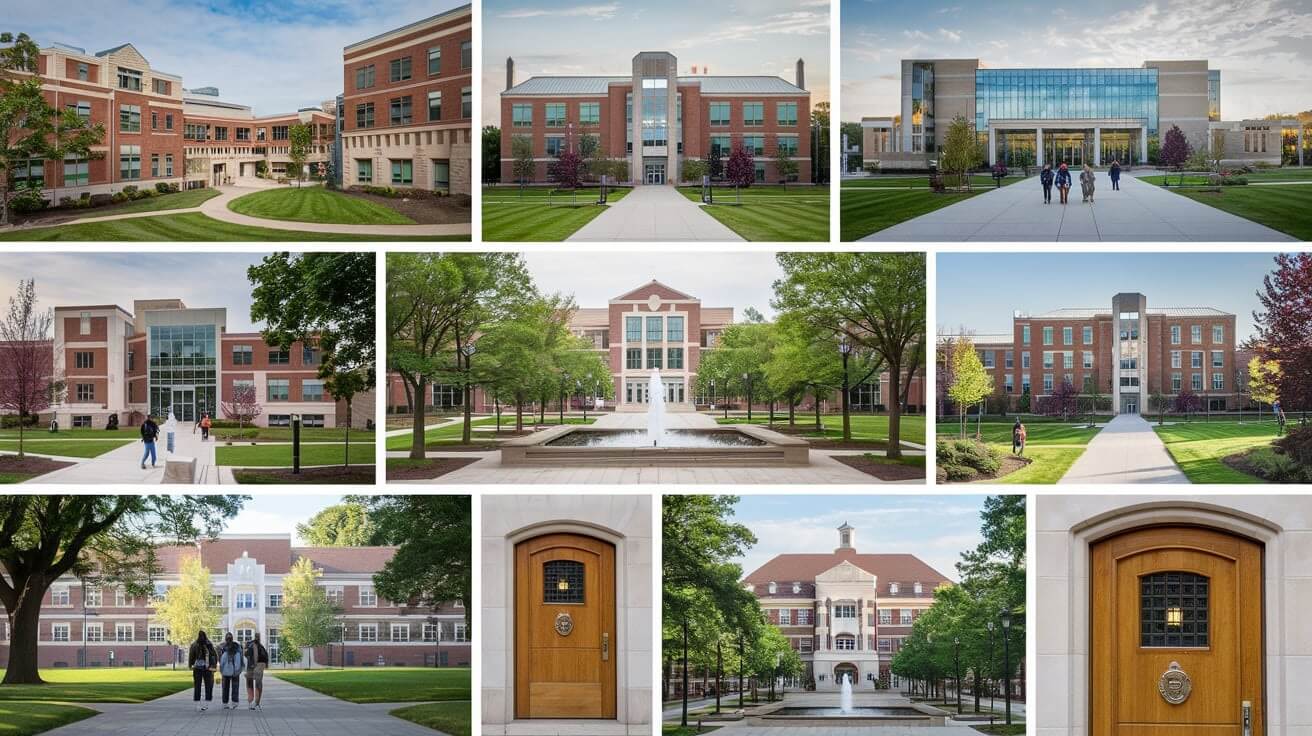
20 Essential Questions to Ask Before Choosing Your College: Student Guide
Introduction
Your college choice is one of the most important decisions of your life. It's not just about academics; it's about finding a place where you'll thrive personally, socially, and professionally. With so many options, it's easy to feel overwhelmed. But you don't have to go through this process unthinkingly. Asking the right questions helps you cut through the complexities, enabling you to make a well-informed choice that aligns with your goals, values, and personal needs.
This guide will explore the 20 essential questions every student should ask when choosing a college. These questions will help you uncover the true character of each institution, ensuring you find a college that aligns with your career aspirations, social preferences, financial situation, and academic interests. Let's dive into each question, providing insights and examples to make your college search more accessible and insightful.

1. Accreditation and Institutional Reputation
Why is this important?
Accreditation is a stamp of approval that ensures the college meets specific academic standards. Choosing an accredited institution is crucial because it reflects the quality of education you'll receive. Accredited colleges are often more recognized by employers, and credits earned are transferable if you switch institutions.
Questions to Ask:
- Does a recognized accrediting body accredit the college?
- Does this accreditation apply to your intended field of study?
- How does the college rank regarding academic quality, and what do alumni say about their experiences?
ð¡ A quick tip:
Use resources like the U.S. Department of Education's database to verify an institution's accreditation status.
2. Campus Safety and Security
Why is this important?
Feeling safe on campus is fundamental to your college experience. Safety isn't just about preventing crimes; it's also about knowing there are resources and support systems if you ever feel threatened.
Questions to Ask:
- What security measures are in place, like campus patrols and emergency call systems?
- What are the college's crime rates, and what steps do they take to ensure safety?
- Does the campus have a student health and wellness center?
3. Diversity and Inclusion Support
Why is this important?
Diversity and inclusion contribute to a rich educational experience. Engaging with people from different backgrounds broadens your perspectives and prepares you for a globalized world. Colleges that prioritize diversity often offer better support for students from varied backgrounds.
Questions to Ask:
- What percentage of students and faculty come from diverse backgrounds?
- Are there student organizations or support services dedicated to minority groups?
- How does the college promote inclusivity and cultural awareness?
4. Networking and Career Services
Why is this important?
The right college should offer more than just a degree; it should provide you with pathways to your career. Look for institutions with solid career services, including resume workshops, internship placement, and alumni networks.
Questions to Ask:
- What career services are available to students?
- Are there networking events, internships, or alumni connections in your field?
- What is the employment rate for graduates within your intended major?
ð¡ Example:
Universities with robust career centers often hold job fairs and networking events, giving students direct access to employers.
5. Location and Setting Preferences
Why is this important?
Location can influence your lifestyle, living expenses, and access to internships or job opportunities. City campuses offer urban experiences and proximity to industries. In contrast, rural campuses might provide a close-knit community and a quieter atmosphere.
Questions to Ask:
- Is the college located in a city or a rural area, and what does this mean for your lifestyle?
- How close is the campus to your home or support systems?
- What public transportation options are available, if any?
6. Food and Dietary Accommodations
Why is this important?
For many students, food is an afterthought until they're on campus and find limited or unsuitable options. Whether you have particular dietary requirements or enjoy certain types of food, exploring the dining options can help you avoid any unexpected disappointments.
Questions to Ask:
- What meal plans are available, and do they cover weekends?
- Are there options for specific vegetarian, vegan, or gluten-free diets?
- How well-rated are the dining facilities by current students?
Personal Insight: Take a campus tour and try the food in the dining hall. This can give you a good sense of quality and variety.
7. Campus Size and Student Population

Why is this important?
The size of a college can affect everything from class sizes to the range of activities available. Larger schools often have more resources and opportunities, while smaller schools might provide a more personalized experience.
Questions to Ask:
- What is the overall student population, and how does this impact class sizes?
- Do you feel comfortable in a large campus environment or prefer a smaller, more intimate setting?
- Are there support systems in place for first-year students?
8. Program Strength in Your Intended Major
Why is this important?
Your intended major should be a strong suit for a college. Look for programs with specialized resources, experienced faculty, and high placement rates for graduates in the job market.
Questions to Ask:
- How does the college's program for your foremost rank compare to others?
- What unique resources are available for students in your field?
- Are there opportunities for internships, research, or fieldwork within the program?
9. Extracurricular Activities and Clubs
Why is this important?
Extracurriculars enrich your college experience, providing opportunities to make friends, develop skills, and pursue passions. A college's activities can enhance your time there, from sports teams to academic clubs.
Questions to Ask:
- What types of clubs, organizations, and activities are available on campus?
- Are there opportunities for leadership within these organizations?
- Can you start your club if a particular interest isn't represented?
10. College culture and values alignment
Why is this important?
Every college has its unique culture, shaped by its history, mission, and student community. Some colleges prioritize rigorous academics, while others focus on athletics, the arts, or social engagement. Finding a college whose culture aligns with your values can make your experience more fulfilling.
Questions to Ask:
- What is the campus atmosphere like—competitive, collaborative, or relaxed?
- Does the school support your values and beliefs?
- Are there campus traditions or events that define the student experience?
ð¡ Example insight:
If you value social causes, a college that promotes community service and offers volunteer opportunities might be a great match. Attend a campus tour, talk to current students, and observe how students interact to get a feel for the culture.
11. Tuition Cost and Financial Aid Options
Why is this important?
College is a significant financial investment, so understanding tuition costs and available financial aid is essential. The cost of college isn't limited to tuition alone—fees for housing, textbooks, and other essentials can add up. Make sure you're aware of the financial resources available to you.
Questions to Ask:
- What is the total cost of attendance, including tuition, housing, and fees?
- Are there opportunities for scholarships, grants, or work-study programs?
- What proportion of students receive financial aid, and what is the typical amount provided?
ð¡ Pro Tip:
Check the college's website for a Net Price Calculator. This tool provides a customized cost estimate tailored to your financial circumstances.
12. Degree completion time and accelerated programs
Why is this important?
While most undergraduate programs are designed to take four years, some colleges offer accelerated options that let you finish your degree in a shorter time. Knowing how long it typically takes students to graduate can help you plan your finances and career timeline.
Questions to Ask:
- What is the average time to complete a degree at this college?
- Are there options for accelerated programs or dual degrees?
- How flexible is the course schedule, and can you take summer or winter classes to graduate sooner?
ð¡ Quick Insight:
Colleges that offer accelerated tracks or partnerships with graduate programs can be a great choice if you want to enter the workforce sooner or pursue advanced studies.
13. Class Size and Student-to-Faculty Ratio
Why is this important?
Class size affects the learning experience and the attention you'll receive from professors. Smaller classes generally mean more interaction, personalized feedback, and close connections with faculty. If you prefer individualized attention, it's crucial to understand the average class sizes and student-to-faculty ratio.
Questions to Ask:
- What is the average class size, especially in your intended major?
- How accessible are professors for office hours, mentoring, and support?
- Are larger classes supplemented with teaching assistants or smaller discussion groups?
ð¡ Example:
A low student-to-faculty ratio can mean more chances for mentorship and academic support. Many liberal arts colleges pride themselves on small classes, while more prominent universities may offer smaller seminars with extensive lectures.
14. Housing Options and Affordability
Why is this important?
Housing plays a significant role in your college experience. Options vary widely, from traditional dormitories to off-campus apartments. Look into the costs, amenities, and student housing policies to see if they match your lifestyle and budget.
Questions to Ask:
- Are first-year students required to live on campus?
- What are the options for upper-level students, and how competitive is on-campus housing?
- Are there affordable off-campus housing options nearby?
ð¡ Tip:
During a campus visit, tour the dorms or student apartments. Seeing the living conditions first-hand can give you a better idea of what to expect.
15. Sustainability and Environmental Initiatives
Why is this important?
Many students today prioritize environmental responsibility. If sustainability is vital, look into the college's green initiatives. This might include recycling programs, sustainable energy practices, or campus-wide efforts to reduce waste.
Questions to Ask:
- What environmental policies or sustainability programs does the college have?
- Are there opportunities for students to get involved in ecological clubs or initiatives?
- How does the college reduce its carbon footprint, and do they track sustainability goals?
ð¡ Example Insight:
Some universities go beyond recycling and composting, investing in green building certifications, solar energy, and electric vehicle charging stations. Research the school's commitment to sustainability through its website or student groups.
16. Retention and Graduation Rates
Why is this important?
Retention and graduation rates reflect how satisfied and supported students feel at a college. A high retention rate indicates that students enjoy their experience and will likely return each year. Graduation rates, meanwhile, show how many students complete their degrees within the expected timeframe.
Questions to Ask:
- What is the freshman retention rate, and how does it compare nationally?
- What percentage of students graduate within four years?
- Are there academic support services to help students stay on track?
ð¡ Stat Insight:
Nationally, about 60% of students complete a bachelor's degree within six years. A higher-rate school may offer more robust academic and personal support services to help students succeed.
17. Curriculum, Research, and Internship Opportunities
Why is this important?
A college's curriculum should go beyond textbooks, offering practical experiences like research projects and internships. Schools with hands-on opportunities can better prepare you for the job market or advanced studies.
Questions to Ask:
- Does the college offer internships, research projects, or co-op programs in your field?
- Are there opportunities for undergraduate research, and how accessible are these to students?
- What partnerships does the college have with local businesses or organizations?
ð¡ Example Insight:
Schools in metropolitan areas often have strong ties to local industries, providing a wealth of internship and networking opportunities. Conversely, colleges with robust on-campus research facilities may offer valuable experiences in fields like science and technology.
18. Alumni Network and Graduate Success
Why is this important?
An engaged alumni network can be invaluable for internships, job opportunities, or career guidance. Graduates who have found success are often willing to mentor current students or offer insights into specific industries.
Questions to Ask:
- How active is the alum network, and do they host events for current students?
- Are there notable alumni in your intended field?
- How does the college support alumni networking and job placement?
ð¡ Example:
Many schools have dedicated alumni organizations that host networking events, career panels, and social gatherings. These events give students a head start in their careers and connecting with successful alumni can open doors and provide valuable mentorship.
19. Admission Requirements and Standards
Why is this important?
Understanding a college's admission standards is crucial as you prepare your application. Knowing your GPA, test scores and other requirements can help you gauge your chances and identify areas that need strengthening.
Questions to Ask:
- What is the average GPA and standardized test score of admitted students?
- Does the college require essays, recommendation letters, or interviews?
- Are there special admissions programs for specific student groups, like early decision or transfer applicants?
ð¡ Tip:
Look up the college's admissions page or speak with an admissions counselor. This information can help you tailor your application and focus on what matters most to the school.
20. Technology Infrastructure and Digital Learning Tools
Why is this important?
With technology becoming more central to education, a college's tech resources can significantly shape your learning experience. Access to reliable Wi-Fi, updated software, and digital learning platforms can be essential for academic success.
Questions to Ask:
- Does the campus have strong Wi-Fi and reliable tech support?
- Are there computer labs, and what kind of software is provided?
- Does the college use digital learning tools like Blackboard, Canvas, or other online platforms?
Conclusion:
Choosing a college isn't just about finding a place to study; it's about finding a community where you can grow, thrive, and prepare for your future. By asking these 20 essential questions, you'll gather information and ensure that your college choice aligns with your values, goals, and needs.
Remember, you're investing in your future, so take your time, explore all your options, and don't hesitate to ask follow-up questions. You'll set yourself up for academic and personal success with the right college choice. Good luck with your college journey—take these questions with you and use them as your guide to finding the perfect fit.
ð Also Like to Read
- What Should I Consider When Choosing a College
- Things to Know Before Admission to College
- Things to Know Before Applying to College
- Things to Know Before Your First Day at College
- 5 Things to Consider Before Taking Admission to Engineering College
- Things to Consider Before Studying Abroad
- What Should I Consider When Choosing a College





